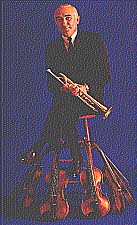Home · Listener's Guide · The Songs · Who's Who · Liner Notes · Selected Tracks · What's New · Search

Ralph Marterie
- Born 24 December 1914, Accerra, Italy
- Died 10 October 1978, Dayton, Ohio
 Ralph Marterie hit the road in 1949 and stayed there for most of the next 30 years. Long after most other big bands had traded in their buses for studio gigs and other sources of steady employment, Marterie was still touring, mostly through the Midwest, playing country clubs and American Legion halls and any other venue with a bandstand.
Ralph Marterie hit the road in 1949 and stayed there for most of the next 30 years. Long after most other big bands had traded in their buses for studio gigs and other sources of steady employment, Marterie was still touring, mostly through the Midwest, playing country clubs and American Legion halls and any other venue with a bandstand.
Marterie migrated with his parents to the U.S. in the early 1920s, and the family settled in Chicago, where his father played with the Civic Opera Orchestra. Music rubbed off early on, and by high school, he was leading a dance band culled from his fellow students and friends. After graduation, he got a job playing trumpet in NBC Radio's studio orchestra in Chicago, where he stayed until World War Two.
He joined the Navy and spent most of the war in charge of a fleet band. He enjoyed leading a band and after the war, he returned to Chicago and was able to get the job of conducting ABC Radio's Chicago studio ensemble. This led to his being offered a contract with Mercury Records, for whom he began recording occasional singles in 1948.
His records sold well enough to convince him to form a touring band and set out on his own. He started working in Wisconsin, Michigan, and other nearby states, a circuit he would return to towards the end of his career. In 1952, his cover of "Caravan" stayed on Billboard's list of top 40 juke box hits for over 10 weeks. He had a few minor hits through the end of the 1950s, all of them covers of current favorites such as "Guaglione," "Tequila," and "Skokiaan."
Marterie's output for Mercury (and later, United Artists and Musicor) is pretty impressive, considering that the market for big band music was steadily diminishing throughout his career. Marterie did relatively little original material--that wasn't what his audiences were interested in, anyway. Many of his recordings are standard swing fare, walking a mid-line between syrupy and jazz, but his stereo era recordings are excellent illustrations of the superb audio engineering that characterized Mercury and other labels in the late 1950s and early 1960s.
Recordings
- Sweet and Lovely, Mercury MG 20010
- Alone Together, Mercury MG 20054
- Dance Band in Town, Mercury MG 20066
- Swing Baby, Mercury MG 20124
- On Bandstand Number One, Mercury MG 20125
- Salute to the Aragon, Mercury MG 20128
- Love Themes of the Classics, Mercury MG 20174
- Young America Dances, Mercury 20198
- Dance Date, Mercury MG 22053
- Jumpin' Trumpet, Mercury MG 20294
- Music for a Private Eye, Mercury MG 20437
- Dance Album, Mercury/Wing MGW-12179
- Soft Tender Trumpet, Mercury/Wing MGW-12185
- Marvelous Marterie, Mercury/Wing MGW-12511
- Dance Party, Mercury SR60004
- College Dance Favorites, Mercury SR60035
- Hi-Fidelity Concert, Mercury SR 60036
- Sing Baby, Mercury SR60124
- Big Band Man, Mercury SR 60183
- 88 Strings, United Artists WWS 8506
- Big Band Themes with 88 Strings and a Golden Horn, United Artists UAS 6177
- Dance to the Music Man, United Artists UAS 6235
- Dancer's Choice, United Artists UAS 6285
- 50 Dance Favorites, United Artists UAS 6349
- 51 Country Club Favorites, Musicor MS 3011
- Motion Picture Hits, Musicor MS 3049
S p a c e A g e P o p M u s i c
Home · Listener's Guide · The Songs · Who's Who · Liner Notes · Selected Tracks · What's New · Search
Email: editor@spaceagepop.com